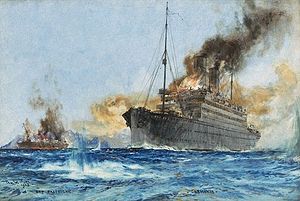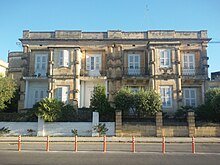Maxwell Hendry Maxwell-Anderson
[1] His father was John Hendry Anderson (1853–1913),[2] a curate in Norfolk who was later Rector of Tooting Graveney and Mayor of Wandsworth.
Soon after his birth the family moved to the south coast when his father was appointed assistant master at Portsmouth Grammar School.
[3] Anderson probably attended the school which had (and still retains) naval links; he subsequently joined the Royal Navy as a midshipman aged 14, on 15 July 1893.
In 1900 he sailed on the Redbreast class gunboat HMS Sparrow for a three-year posting to the Australia Station.
During the second of these a Fijian woman was murdered, and Sparrow engaged in some gunboat diplomacy by firing a few blank shells into implicated villages.
Anderson wrote an extensive and interesting report on the 1902 cruise of the Sparrow, which was printed in the Sydney Morning Herald.
[10] Sparrow's commission ran out while she was still in the Pacific, and Anderson probably returned to Britain in 1904 with the other officers and crew by mail steamer.
[14][Note 1] Having qualified as a barrister, from March 1916 onwards he acted as counsel for the Admiralty in the many prize law claims arising from the capture or sinking of enemy vessels by British ships during the war.
[18] For example, a captured or sunk battleship with a complement of 453 officers and men (confirmed as soon as possible by affidavit) was worth £2,265.
This concise volume reviewed the state of maritime law regarding prize bounty, salvage, and recapture.
[31] He stood as the Liberal Party (UK) candidate for the newly created constituency of Balham and Tooting in the December 1918 United Kingdom general election.
Taking his election address as an example, the historian Matthew Johnson remarks: "Many candidates were careful to present their wartime military service not only as a marker of martial masculinity but as a demonstration of their roots within a constituency, emphasizing service in a local regiment as a means of tapping into the politics of place—one of the more potent sources of resistance to the nationalization of politics after 1918.




